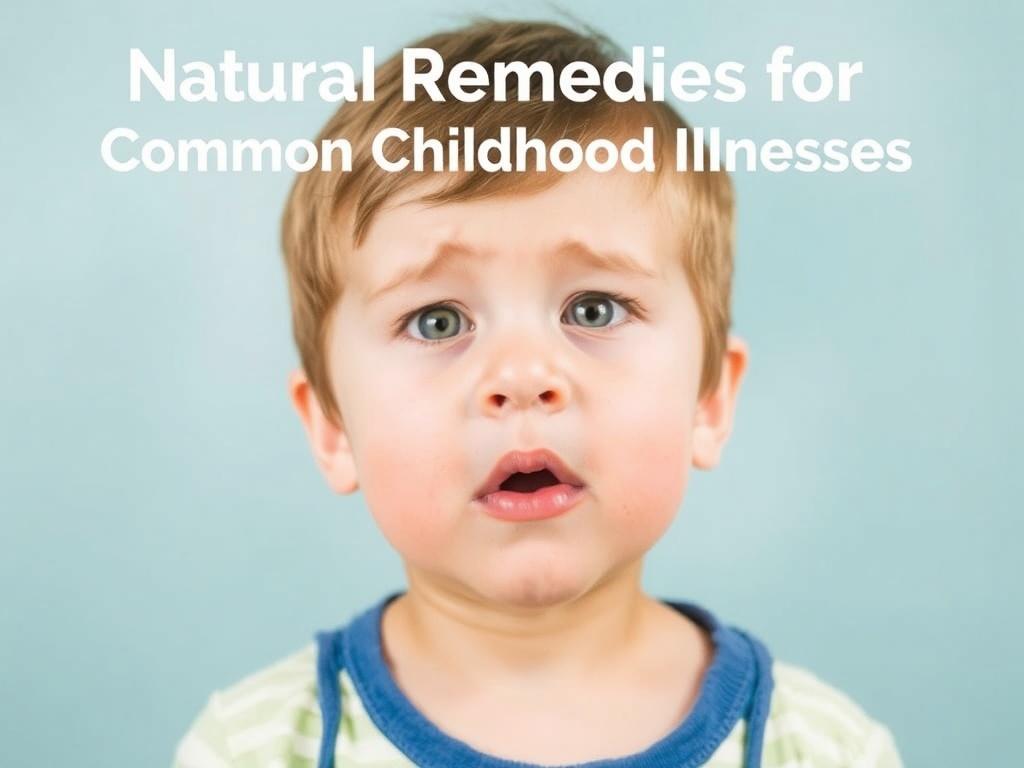SQLITE NOT INSTALLED
Every parent wants the very best for their child’s health, especially when they face common childhood illnesses. While medicine and doctors play a critical role, many families turn to natural remedies to ease symptoms and support healing in a gentle and holistic way. Natural remedies can offer comfort without the harsh side effects sometimes associated with pharmaceuticals, making them a popular choice for nurturing little ones through coughs, colds, tummy troubles, and more.
In this comprehensive guide, we will dive deeply into natural remedies for common childhood illnesses, explore the science behind them, and provide practical advice that you can confidently use at home. Whether you’re looking for ways to soothe a fever, calm a cough, or improve digestion, this article is designed to be your trusted companion on the journey to your child’s wellness. Let’s explore how nature’s gifts can support your child’s health with safety and care.
Understanding Common Childhood Illnesses

Before we delve into natural remedies, it’s important to understand what we mean by ‘common childhood illnesses.’ These are the ailments that occur frequently in infancy and childhood, often due to developing immune systems and the natural exposure to germs and viruses in daycares, schools, and playgrounds. The most frequent ailments include colds, flu, ear infections, tummy troubles such as diarrhea and constipation, mild fevers, and skin conditions like eczema or rashes.
While these illnesses can cause distress, most of them are mild and resolve on their own. However, managing symptoms effectively is key to helping children feel comfortable and recover quickly. Natural remedies can play a vital role here by providing symptom relief and supporting the immune system without over-reliance on medications.
Why Choose Natural Remedies?
Natural remedies have been used for centuries across cultures to soothe and heal children. Parents often look to natural solutions because they prefer approaches that:
- Use ingredients that are gentle and free from synthetic chemicals
- Support the body’s own healing processes
- Reduce reliance on over-the-counter medications with potential side effects
- Offer holistic benefits—addressing emotional comfort as well as physical symptoms
Of course, natural remedies should not replace professional medical advice or treatment in serious cases, but they can complement conventional care very well. The key is balance and informed use.
Natural Remedies for Respiratory Issues: Colds, Coughs, and Sinus Congestion
Respiratory illnesses are some of the most common complaints in children. The typical symptoms include runny noses, coughs, sneezing, and nasal congestion. These can be uncomfortable and disrupt sleep and appetite, which in turn slows recovery. Natural remedies are particularly effective at easing these symptoms.
Honey: Nature’s Soothing Syrup
One of the most time-tested natural remedies for coughs is honey. Packed with antibacterial properties and acting as a soothing agent, honey coats the throat and reduces the irritation that triggers coughing.
How to use: For children over one year of age (honey should never be given to infants under 12 months due to Botulism risk), a teaspoon of honey before bedtime can ease nighttime coughing and promote restful sleep.
Steam Inhalation and Humidifiers
Dry air can worsen congestion. Using a humidifier in your child’s room, especially during cold or flu seasons, can keep their nasal passages moist and reduces the discomfort of a blocked nose. Additionally, warm steam inhalation—under close supervision—can loosen mucus and clear airways.
Tip: Add a few drops of child-safe essential oils like eucalyptus or lavender to the humidifier for added relief, but always check for any sensitivities first.
Herbal Teas to Calm and Heal
Mild herbal teas such as chamomile or elderflower can provide comfort, reduce inflammation, and promote relaxation. Chamomile is also known for its mild sedative properties, which can help children rest better while fighting an infection.
Natural Chest Rubs
Instead of commercial chest rubs with synthetic chemicals, make your own using coconut oil blended with small amounts of child-safe essential oils like lavender or tea tree oil. These natural chest rubs can help ease breathing and provide a calming sensation.
Natural Remedies for Fevers in Children
When your child runs a fever, it’s natural to worry. Fever is actually a sign that the body is fighting infection. The goal of natural fever management is to ensure comfort and prevent overheating without completely suppressing this important immune response.
Keep Hydrated
One of the most important supports is to keep your child well-hydrated. Fever can increase fluid loss through sweating, making dehydration a risk. Offer plenty of water, diluted fruit juices, or natural electrolyte drinks made with coconut water and a pinch of sea salt.
Cooling Cloths and Lukewarm Baths
Instead of harsh medications, using lukewarm sponge baths and cooling cloths on the forehead can gently bring down the temperature. Avoid cold baths or ice packs which can cause shivering and discomfort.
Nutrition to Support Healing
Light, nutritious foods rich in vitamins and minerals can boost the immune system—think fresh fruits, vegetables, broth-based soups, and easily digestible grains like oatmeal.
Natural Solutions for Ear Infections
Ear infections are painful and common among toddlers and young children. While antibiotics are often prescribed, some minor ear infections can be managed at home with natural remedies, always under your healthcare provider’s guidance.
Warm Compresses
Applying a warm compress over the affected ear can relieve pain and reduce inflammation. Use a warm washcloth and ensure it’s comfortably warm, not hot, to avoid burns.
Garlic Oil Drops
Garlic has natural antimicrobial properties. Warm garlic oil drops are sometimes used to ease ear infections. This remedy should only be used if the eardrum is intact and under a pediatrician’s recommendation to avoid risk.
Ensuring Tummy Health: Natural Remedies for Diarrhea and Constipation
Gastrointestinal disturbances can be distressing for both children and parents. Understanding simple, natural solutions to manage diarrhea and constipation can make a world of difference.
Probiotics for Digestive Balance
Probiotics are friendly bacteria that help restore gut balance. Natural sources like yogurt, kefir, and fermented foods can support digestion. In supplement form, probiotics may reduce the duration of diarrhea.
Hydration and Electrolyte Balance
For diarrhea, maintaining hydration is paramount. Homemade oral rehydration solutions (ORS) made from water, salt, and sugar can prevent dehydration.
Fiber-Rich Foods for Constipation
Increasing fiber via fruits such as prunes and pears, and vegetables like peas and spinach, promotes bowel movements. Adequate water intake enhances fiber’s effectiveness.
Skin Care Remedies for Eczema and Rashes

Many children suffer from eczema or rashes that cause itching and discomfort. Natural skin care remedies can soothe inflamed skin and help rebuild the natural skin barrier.
Coconut Oil for Moisturizing
Coconut oil is a natural moisturizer with antibacterial properties. Applying virgin coconut oil regularly can reduce dryness and irritation.
Oatmeal Baths
Add finely ground oatmeal to bathwater to relieve itching and calm inflamed skin. Oatmeal contains compounds that protect skin and retain moisture.
Avoiding Irritants
Use gentle, fragrance-free soaps and detergents. Dress your child in breathable cotton fabrics to reduce further irritation.
Boosting Immunity Naturally
It’s important to look beyond immediate symptom relief and consider how to support your child’s overall immunity naturally, helping to reduce the frequency and severity of illness.
Balanced Nutrition
Feeding children a diet rich in colorful vegetables, fruits, whole grains, and healthy fats provides essential vitamins and antioxidants. Key nutrients like vitamin C, vitamin D, and zinc are important for immune health.
Regular Physical Activity and Fresh Air
Active play and time outdoors support robust immune function and overall wellbeing. Fresh air circulation also helps reduce germ buildup.
Sufficient Sleep
Sleep is critical to immune system strength. Establish calm nighttime routines and ensure adequate rest according to your child’s age requirements.
Safety Considerations and When to See a Doctor
While natural remedies can be very helpful, it’s essential to recognize their limits. Not all illnesses can or should be managed at home, especially if your child shows signs of severe disease.
Warning Signs to Watch For
| Symptom | Significance |
|---|---|
| High or persistent fever (over 102°F or lasting more than 3 days) | Possible serious infection requiring medical assessment |
| Difficulty breathing or persistent wheezing | Potential respiratory distress |
| Severe dehydration (dry mouth, sunken eyes, no tears) | Requires urgent fluid replacement and care |
| Severe abdominal pain or continuous vomiting | Possible gastrointestinal emergency |
| Signs of allergy or anaphylaxis (swelling, rash, difficulty breathing) | Immediate emergency intervention needed |
Consulting Your Healthcare Provider
If you’re ever uncertain about your child’s symptoms or how to use natural remedies safely, don’t hesitate to consult your pediatrician. They can help you balance natural approaches with necessary medical treatments.
Summary of Common Natural Remedies for Childhood Illnesses

| Illness | Natural Remedy | Benefit | Age Consideration |
|---|---|---|---|
| Common Colds and Coughs | Honey, Steam, Herbal teas | Soothing throat, clearing congestion | Honey not for under 1 year |
| Fever | Hydration, Lukewarm baths | Comfort and temperature regulation | All ages, monitor carefully |
| Ear Infections | Warm compress, Garlic oil drops | Pain relief, antimicrobial | Use with doctor advice |
| Diarrhea | Probiotics, ORS | Restores gut flora, prevents dehydration | All ages |
| Constipation | Fiber-rich foods, Hydration | Promotes regular bowel movements | All ages |
| Eczema and Rashes | Coconut oil, Oatmeal baths | Moisturizing, anti-inflammatory | All ages |
Final Thoughts
Parenting through childhood illnesses can often feel overwhelming, but natural remedies offer a way to support your child’s health holistically and compassionately. Remember, nature provides a treasure trove of gentle healing options that work best when combined with good nutrition, proper rest, and medical guidance when necessary.
Empower yourself with knowledge, listen to your child’s needs, and don’t hesitate to seek medical care when required. With care, patience, and these natural tools at your disposal, you can help your little ones weather the common illnesses of childhood more comfortably and confidently.
Thank you for joining me on this journey into natural remedies. Here’s to your child’s health and happiness!

Спасибо автору, очень полезно. Когда у моего сына была простуда, промывания носа и тёплые ингаляции с ромашкой реально выручили — за пару дней стало легче, обошлись без сильных лекарств, беру советы на постоянку.